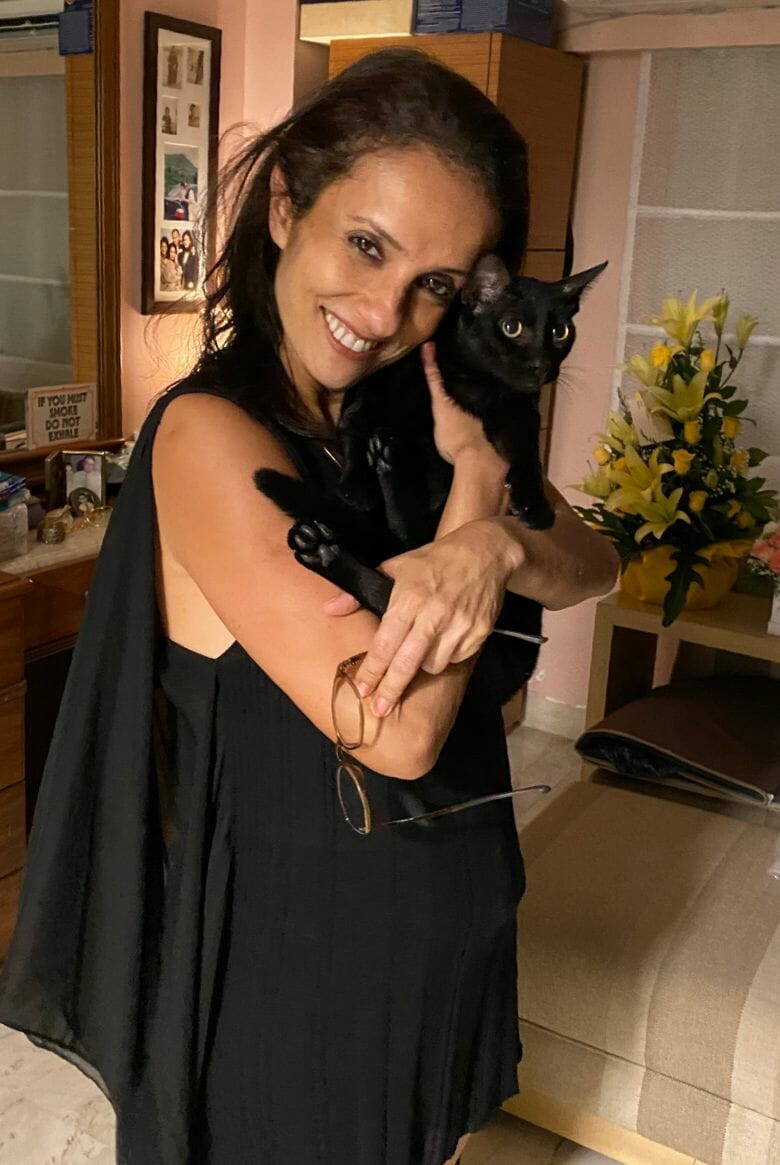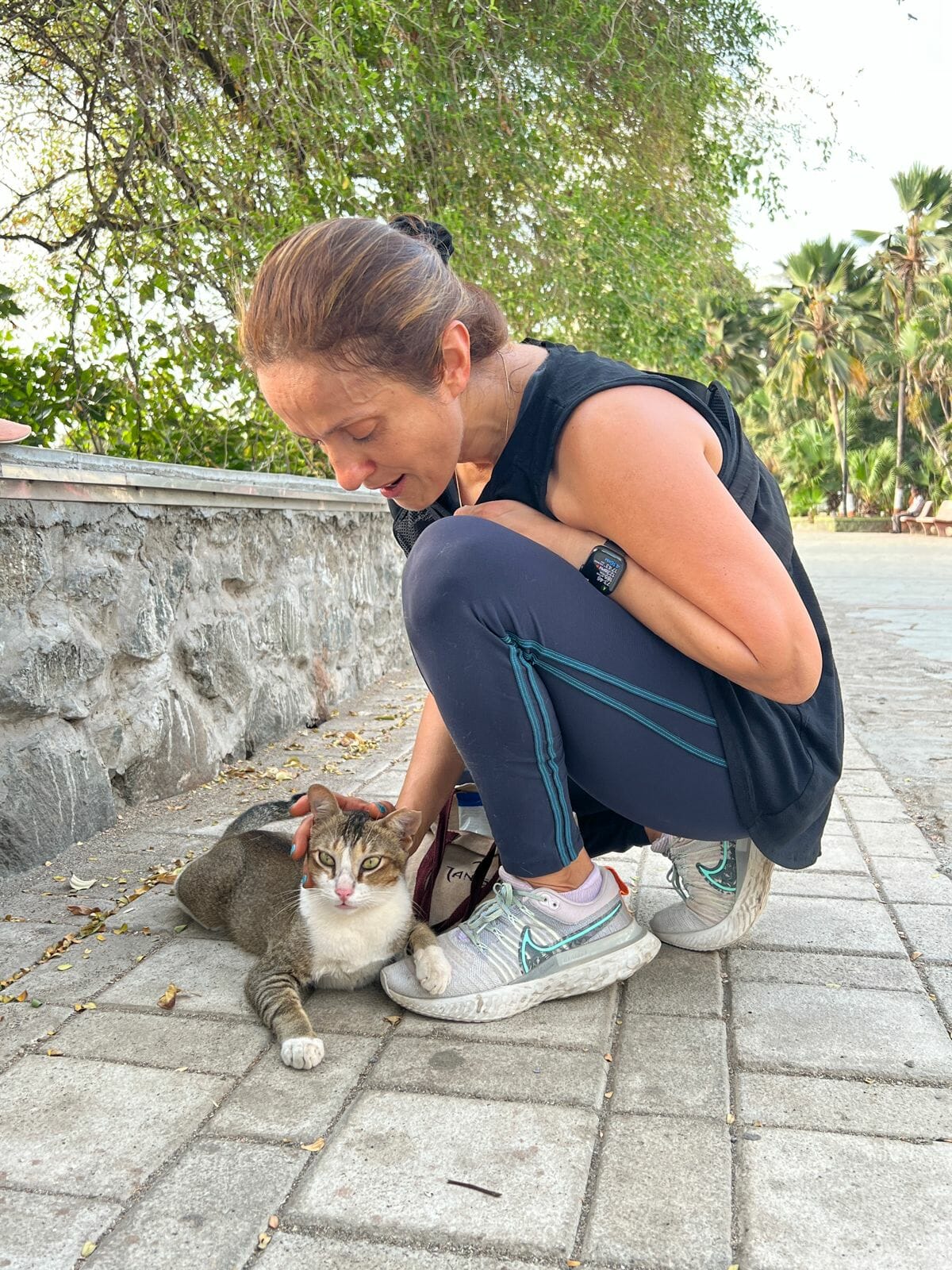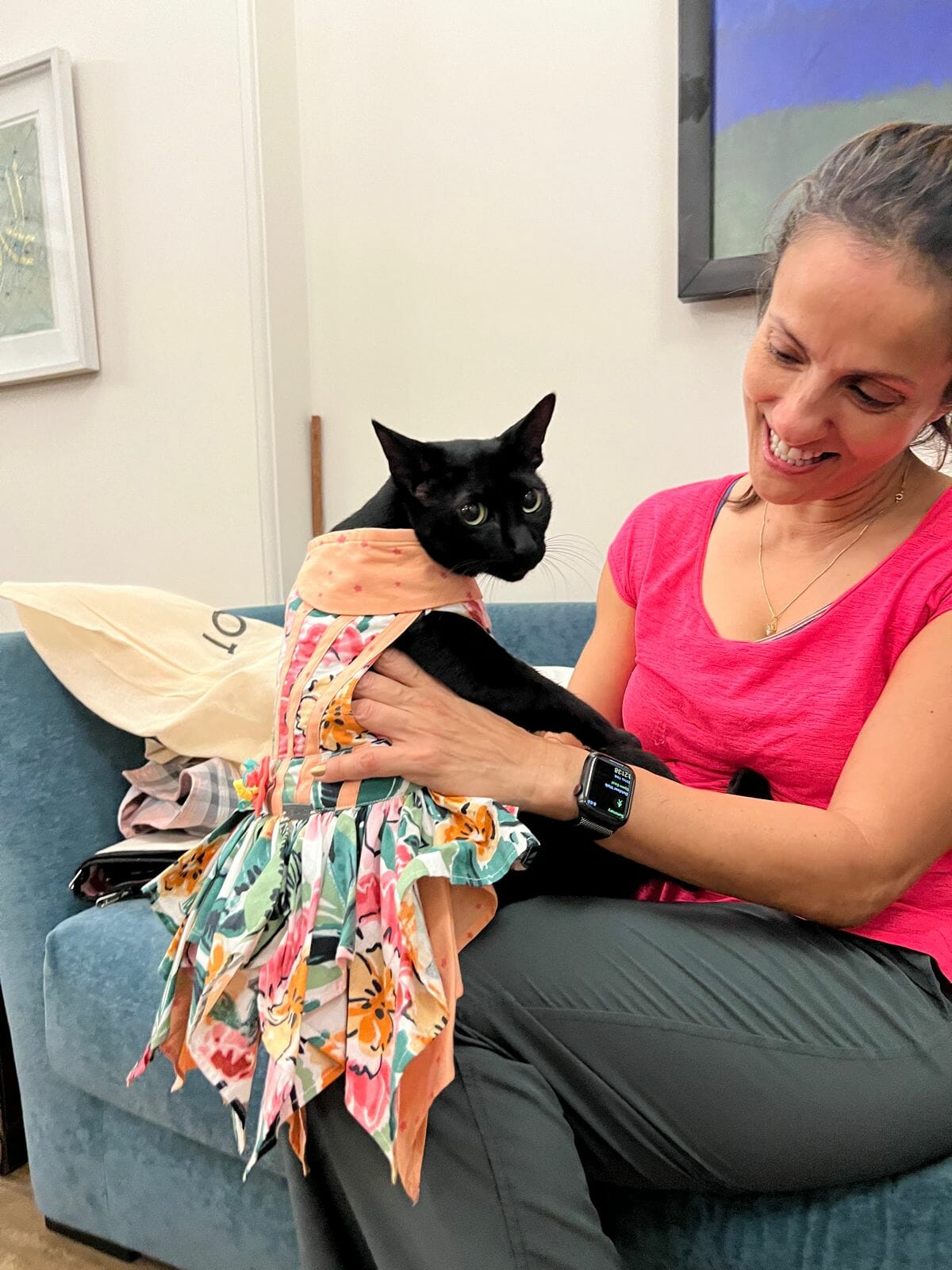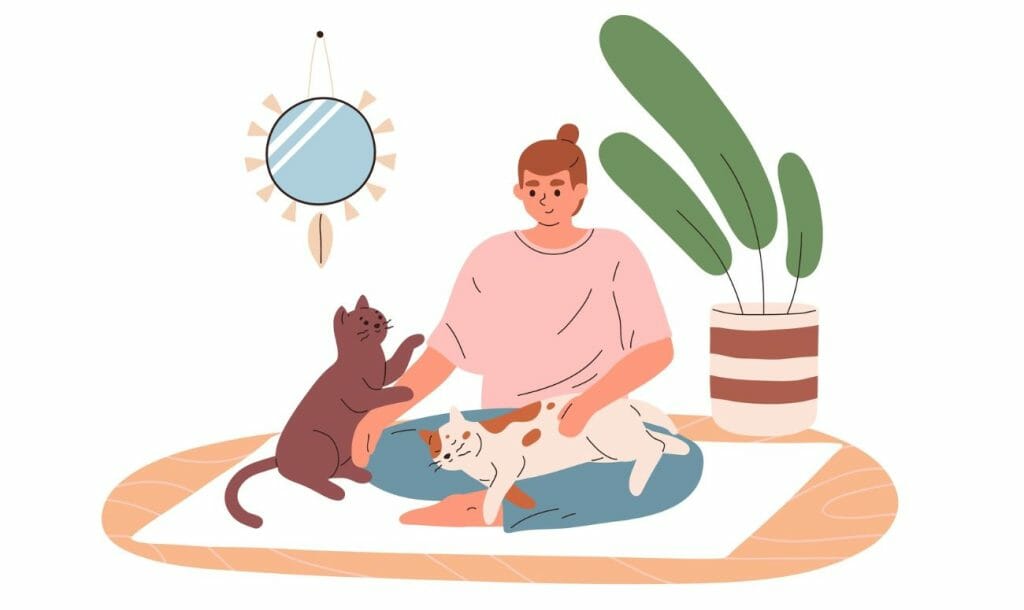Although we adore looking at sweet kittens, it’s also wonderful to get to know the person behind the camera and the cat moms and dads who care for these fur babies. Not just their own pets but also stray animals whom they treat just like their children. And while everyone can’t adopt or foster a stray into their homes, that doesn’t mean you can’t truly take care of them. If you’re looking for some inspiration on how to help street cats, ThinkRight.me spoke with CM (Cat Mother) of Carter Road, Sausan Bukhari who’s created a loving community of stray cats that have become as dear as her own.

Let’s Get to Know Sausan Bukhari
Sausan Bukhari is a resident of Bandra, Mumbai who is actively involved since July 2020 in the welfare of strays in her community.
Since then, her family has adopted 6 cats from Carter Road, houses 19 in their building society, feed over 40 strays daily, neutered over 200 and have rehabilitated and housed over 100 cats and 8 dogs.
Sausan supports many feeders and rescuers in her community, across state borders as well as overseas.
Her main objective is to better the lives of strays, by controlling their population, creating economical, safe shelters, bringing awareness among the human population and changing the mindset of people from buying an animal to adopting one that needs a home.
ThinkRight.me: How did your page begin?
Sausan Bukhari: I started the page this March on my mom’s birthday because my mom passed away a few years ago. I realised that my private page was getting very muddled, and I just wanted to dedicate a page to the animals that we were rescuing, and I also wanted it to be a platform for other people who have, you know, animals to be adopted or rescued or fundraising, so this is why we started CM of Carter Road.
TRM: How did you get into this field of work? Of becoming an advocate for animal welfare? Is there a particular animal experience that made you want to start?
SB: I would go for a walk every day on Carter Road and see a lot of stray cats. But at that time there were just stray cats with whom I would sit and pet and take pictures. Then, during the lockdown, somebody left a box of four kittens in our building and we had no clue what to do with them. We did what we could but then one of the kittens ran away in the first three months and we never found her again. Then, we were left with three, and we would look after them. We were very heartbroken when that one kitten disappeared, so we spoke to some rescuers and asked them whether we should bring them home and they told us no, you can rehabilitate them and keep them in the building itself by feeding them and looking after them and getting them sterilised.
So, in November, because we were caring for these animals, I started realising how bad the situation for strays in my community is and in November of 2020, we decided to pick up a little kitten from Carter Road who became our very first pet. His name is Frank. And once we had him home, it was like the floodgates opened. We picked up another kitten and then I started picking up cats and fostering them and finding homes for them. Today, we have 6 kittens in two different homes, and we have 18 cats in our building that we have neutered who we feed them daily. Of course, I look after their medical needs as well. And we feed around 24 cats on Carter Road. Also, I stopped counting at about 80 neuterings, I don’t know how many more we’ve done after that Plus, you know people reach out to me now because of the CM of Carter Road page when they need help and I’m more than happy to extend a helping hand when and if I can. Let me tell you, the inspiration for it all was Frank.
TRM: In the last few years, we’ve seen a rise in abandoned animals. What do you think has caused this spike and how can we as a society make it better?
SB: The spike in abandonment happened during the lockdown. First, there was this false rumour that your pets could give you COVID and secondly, of course, the financial situation of a lot of people pushed them to abandon their animals. That’s where I feel the spike happened, in pockets of Bombay where people were probably more pet friendly.
We as rescuers and people working in animal welfare are urging people to start by feeding their community animals, and this means animals in your building, in buildings in your locality or in the street where you go for morning walks. Try and feed as many strays as you can. Familiarise yourself with them and then once they know you and trust you, you can go about further taking care of them, like getting them neutered, and taking them to the vet. That’s the most important thing we need to focus on; getting them sterilised and the second thing is keeping an eye on their health care. You get them periodically dewormed, you get them the medical attention they need, and if they’re injured, even if they have a small scratch on them, you can just apply an ointment which you can carry with you. And of course, if you need further help, there are NGOs who will help you get them treated for if not free then for a nominal fee. Remember, once you choose to care for them, they become your responsibility.

About encouraging people to care for animals. Well, they’re less privileged than you. So, I believe it is our divine responsibility to look after them and that consciousness comes once you care for them. You can’t turn away once you’ve formed a bond with any animal, anywhere in the world.
TRM: How can people start looking at strays in a different light? People aren’t so welcoming yet, how can we educate them and refine this perspective?
SB: The only way you’ll start looking at them in a different light is when you start thinking of them not as a nuisance but as someone who has the right to exist just as you do. This planet doesn’t only belong to humans, it also belongs to the animals, the plants, and the several beings created to thrive on Earth. It belongs to everybody, and we must start thinking in those terms that these animals have as much of a right to exist in this city, in our community, and in our buildings as we do. It’s okay if you don’t wish to bring them home, but let them live around you. As long as they don’t bother you, don’t think of them as trouble. And it is your responsibility to watch out for them as you would for someone less privileged than you are.
Unfortunately, a lot of people in a position of privilege find strays a nuisance. But it doesn’t work that way. They’re not a nuisance. They can be domesticated when cared for. Why should we let them live in this desperate situation, leaving them scrounging through our garbage? If you can afford to feed them food, why should they suffer like this? We have to realise that taking responsibility and not turning away is the only way we can solve this problem. And I’m not saying everybody should become an animal rescuer, but yes, be aware of your surroundings and the animals that live amongst you. Help them. You know have a better life. You have a better existence and once you stop seeing them as a nuisance is when a change will come in. The answer is to learn how to coexist.

TRM: What do you think is the one thing people could do or change that would help homeless animals or lower the numbers?
SB: The best way that people could change the situation that we’re facing right now is:
- First, find out who your local NGOs are. Who’s going to extend that helping hand when you need it?
- Second, keep your eyes open. Look at every animal that exists around you and try and feed it. Become friends with them. Some animals are friendlier than others while some take very long to trust you. The reason? Most of them don’t trust you because they have PTSD from what humans have done to them in the past. So, establish trust amongst them and then figure out what needs to be done. Ask Google. I mean we Google everything right? There’s no answer you won’t find on Google. You see whether they’re injured last, hiding, not coming out, whatever it is, Google that question and figure out how you can help the animal.
- Once you find out the issue you can reach out to the NGO you know, reach out to someone like me who knows a little more or anybody you know who has more knowledge about animal rescue. They will help you; they will give you advice on what to do next.
- Lastly, please stop looking at them as a nuisance. Please stop buying pets. Please adopt instead. There are so many animals that need homes and there are a variety of choices. You know, animal shelters have Persians, they have Cocker spaniels, they have Alsatians. They have every breed conceivable, most of who have been abandoned by their owners. And these animals cannot survive on the street. They need to be in homes. Every animal needs to be in a home.
If you ask me, I wish I could give all the cats that I feed on Carter Road home for safety. The animals on the street have a life span of four to five years. In your home, they could live up to 20 years. If you’re still shy about bringing them home, try your best to keep them safe and healthy. You could save a life, truly.
Read More: 5 Ways To Cultivate A Daily Meditation Routine
Like & Follow ThinkRight.me on Facebook, Instagram, Twitter, Pinterest and Telegram to stay connected.






























